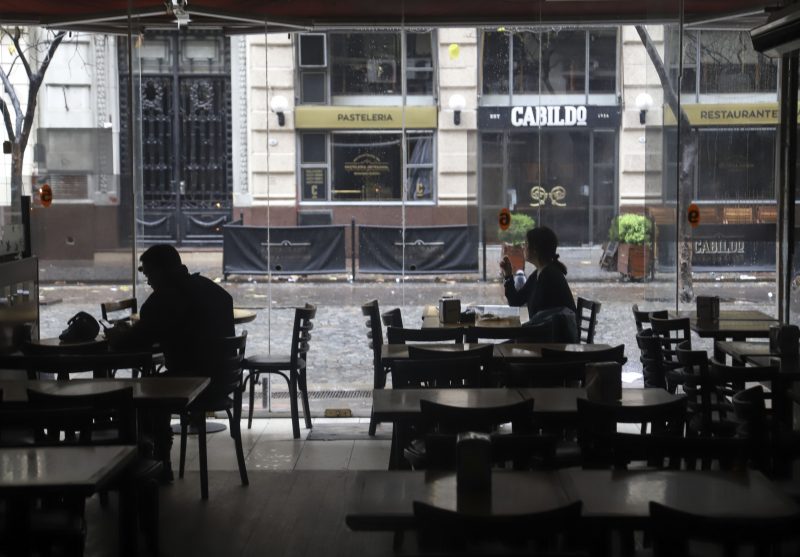Argentina opens probe into blackout causes
Diners are pictured at a restaurant during a power cut in Buenos Aires on June 16, 2019, in a photo released by Noticias Argentinas (Juan VARGAS)
Buenos Aires (AFP) – Argentina announced an inquiry into the causes of a massive blackout that left nearly 50 million people without power as Energy Minister Gustavo Lopetegui admitted Monday it may take two weeks for the full picture to emerge.
President Mauricio Macri’s center-right government still does not know what caused the problem, more than 24 hours after the outage left nearly all of Argentina and Uruguay and, briefly, parts of Paraguay in darkness.
Power to most areas was restored by late Sunday but Macri, who has targeted utilities like electricity for price hikes as part of his market friendly reforms, came in for heavy criticism on Monday.
Lopetegui meanwhile told Argentine radio that technical data from the “black boxes” of two companies responsible for electricity supply would be examined in depth, but the results of their investigation would not be known for about 15 days.
“Thousands of pieces of data” from the two companies, Cammesa and Transener, would have to be analyzed, he said.
“The two companies have to provide the report of what happened over the next 72 hours, with that information Cammesa will provide a report of what happened until 7:07 am, and in 15 days we will know what was the sequence of events that caused the blackout,” Lopetegui told Radio La Red, referring to the time when the massive power failure occurred.
– Safeguard failure –
Investigations have so far focused on the electrical supply system from Yacyreta, a hydroelectric dam on the border with Paraguay.
The blackout “was something serious that should not have happened,” the minister said, adding that a key question was why normal safeguards did not kick in.
“We have to know why the system did not act as it does every day, because failures happen every day.”
Some 44 million people in Argentina and 3.5 million in neighboring Uruguay, with which it shares a common power grid, were left without power for more than 10 hours on Sunday, before it was gradually restored.
The blackout halted metro and train services in Buenos Aires and forced hospitals and clinics in major cities to resort to using generators.
Authorities said the economic fallout from the outage was largely contained however as the blackout struck on a Sunday, when shops and offices were closed.
The biggest economic casualties were thought to be restaurants expecting bumper business from Father’s Day family meals.
“This killed us,” Luciano Ferreira, the owner of a popular restaurant in the Boedo neighborhood of Buenos Aires, told AFP.
The other major loser appeared to be Macri’s government.
Alberto Fernandez, the left-wing leader seen as Macri’s main challenger in October elections, led the criticism, accusing the government of “a lack of a sense of responsibility and knowledge of what is happening in the country.”
On Sunday, he shared a tweet Macri published in 2013, when he said that frequent power cuts then “are a symbol of the failure of energy policy” under former president Cristina Kirchner, who is Fernandez’ running mate.
The government was also blamed for a lack of communication on the blackout.
Lopetegui held a news conference Sunday only at around 3:00 pm — eight hours into the blackout — in which he ruled out a cyber-attack as the cause.
“There is zero chance of a repetition,” he added.
“Government officials have said they are investigating and still do not know what caused the problem. The government has come under criticisms for this, particularly from the opposition,” said Eurasia analysts’ Daniel Kerner.
“The increase in energy prices over the past three years has been one of the government’s weakest points and a major source of social discontent.”
Argentina and Uruguay have a common power grid centered on the bi-national Salto Grande dam, 450 kilometers (280 miles) north of Buenos Aires.
Disclaimer: Validity of the above story is for 7 Days from original date of publishing. Source: AFP.


